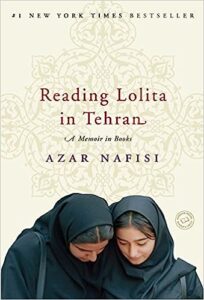Reading Lolita in Tehran by Azar Nafisi
Publisher: Random House Trade Paperbacks
Genre: Non-fiction, Historical
Rating: 5 stars
Reviewed by LavenderFor two years before she left Iran in 1997, Nafisi gathered seven young women at her house every Thursday morning to read and discuss forbidden works of Western literature. They were all former students whom she had taught at university. Some came from conservative and religious families, others were progressive and secular; several had spent time in jail. They were shy and uncomfortable at first, unaccustomed to being asked to speak their minds, but soon they began to open up and to speak more freely, not only about the novels they were reading but also about themselves, their dreams and disappointments. Their stories intertwined with those they were reading—Pride and Prejudice, Washington Square, Daisy Miller and Lolita—their Lolita, as they imagined her in Tehran.
Nafisi’s account flashes back to the early days of the revolution, when she first started teaching at the University of Tehran amid the swirl of protests and demonstrations. In those frenetic days, the students took control of the university, expelled faculty members and purged the curriculum. When a radical Islamist in Nafisi’s class questioned her decision to teach The Great Gatsby, which he saw as an immoral work that preached falsehoods of “the Great Satan,” she decided to let him put Gatsby on trial and stood as the sole witness for the defense.
Azar Nafisi’s luminous tale offers a fascinating portrait of the Iran-Iraq war viewed from Tehran and gives us a rare glimpse, from the inside, of women’s lives in revolutionary Iran. It is a work of great passion and poetic beauty, written with a startlingly original voice.
Azar Nafisi left Iran in the late 1990s for America with quite a story to tell. She teaches at John Hopkins University and was a teacher of English literature in Tehran. Why did she leave?
Reading Lolita in Tehran is a touching story of the author’s experiences in Iran, especially as a woman. She defied authorities and prodded others to do so. Her account of this fascinating situation is underlined with discussions of literature and how it can open minds. She brilliantly tied the people in famous books with what was happening around her and tells a very human story of struggle and relationships.
Nafisi’s writing flows and is down to earth, bringing one in the moment. Readers will learn about the dramatic things happening in her country but will also be treated to learning about great works of writing. This author’s emotional narrative is smart and well worth the read.
























Speak Your Mind